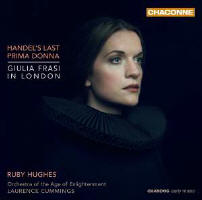Texte paru dans: / Appeared in: |
|
|
Outil de traduction ~ (Très approximatif) |
|
|
Reviewer: Raymond
Tuttle
This release is fascinating on
several levels—who was Giulia Frasi anyway? The two arias by Vincenzo Ciampi
are receiving their first recordings, as is the aria from John Christopher
Smith’s oratorio Rebecca, and the air from Philip Hayes’s masque Telemachus.
They are not all of equal interest, but the best of them make you wonder why
they have been sitting on the shelf for so long. Then there’s Ruby Hughes
herself, a young Welsh soprano (who graduated from Guildhall as a cellist!)
who specializes in the Baroque repertory. Add to that the always sensitive
and frequently moving accompaniments by Cummings and the Orchestra of the
Age of Enlightenment, and you have a disc whose spell continues acting its
magic long after the last note has faded away.
We don’t know the year in
which Frasi was born, but she made her debut in 1740, and two years later
she arrived in London to join the Italian singers and musicians who already
were there to feed the Londoners’ taste for Italian opera. Handel was not
the first composer whose music she sang in London. In fact, she spent a year
or two singing minor roles, and she did not come to Handel’s attention until
1748, when he was entering the last decade of his career. Her sung English
seems to have been admirably intelligible, and she earned a reputation for
singing roles that required her to project pathos. As David Vickers writes
in the accompanying booklet note, she was associated with oratorios
“containing vivid scenes of sentimental and spiritual drama that depict
suffering women reacting to extremely distressful events with courage,
dignity, and selflessness.” Her voice was described as sweet and clear; the
adjective “brilliant” is conspicuously absent. In the debit column, Frasi
might have had a complacent attitude to work, and as her popularity and her
career faded in the 1760s and 1770s, her taste for spending money did not.
According to Vickers, she left England in 1774 with bill collectors on her
trail. This brief biography suggests that Frasi might have been just another diva of the day, but the music that Handel and his contemporaries composed for her was superior. On this disc, the ornate and overtly virtuosic music that period composers wrote for some of their singers is not much in evidence. High notes, trills, dramatic leaps from one note to the next, and so on, are not the point of this music. The selections included here play to what appear to have been Frasi’s strengths: piety, melancholy, calm submissiveness, and a quiet spiritual confidence. Hughes writes that many of her favorite Handel heroines originated with Frasi. When she became aware of this, she was driven to learn more about the woman and her other roles. With the assistance of David Vickers, that interest formed the basis of this CD. It is telling that one of the least successful selections on this CD, the aria from Ciampi’s Il trionfo di Camilla, is written in a more brilliant style. This is one of those standard-issue Baroque arias in which turbulent waters are a metaphor for the singer’s agitated state of mind, and the high notes are like sudden flashes of lightning. Music like this was not Frasi’s claim to fame, and similarly, soprano Hughes gets through this aria satisfactorily, but hardly imposingly. Her voice is not heavy enough to give it the power that it seems to need, and some of the high notes are unattractively yipped out. Still, to have reservations about only one aria in a program containing more than a dozen is pretty good. Another soprano who sang several of Frasi’s roles was the late Lorraine Hunt Lieberson. Her recording of the aria from Susanna (from her complete Harmonia Mundi set) is beautifully sung, but her voice is more mature than Hughes’s, and the conducting (by Nicholas McGegan) a little too pushy for my liking. On the other hand, in their recording of Theodora, Lieberson and McGegan are more dramatically forward in “With Darkness deep as is my Woe,” to good effect. Lieberson’s pleas of “Hide me” are arresting, where Hughes is more passive and conventional. Clearly, perfect Handelians will want to hear both of these fine singers, and will derive different pleasures from each of them. Despite my minor complaints, this disc is a must-hear for anyone who cares about Handel’s vocal music, and also for those who have not heard the still youthful Ruby Hughes ... even if her vocal hues are more turquoise than ruby! | |
|
|
|
|
|
|
|
Cliquez l'un ou l'autre
bouton pour découvrir bien d'autres critiques de CD |
|




